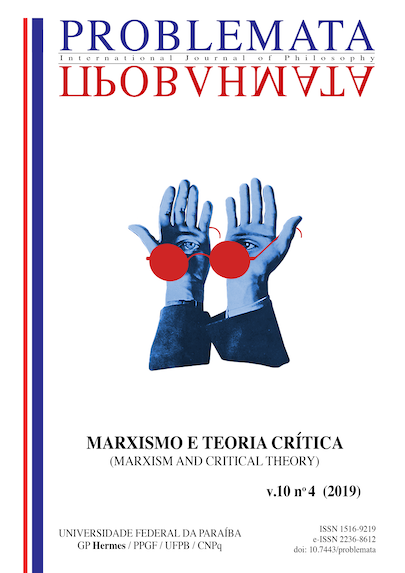THE POWER IN MICHEL FOUCAULT AND THE AXEL HONNETH’S CRITICISM
DOI:
https://doi.org/10.7443/problemata.v10i4.49682Keywords:
Foucault, Honneth, Power, Critical theoryAbstract
Michel Foucault and Axel Honneth can be considered heirs of Critical Theory and the philosophers of the “Frankfurt School”. Foucault's conceptions of “power” and “power relations” present another way of problematizing the constitution of the subject. For Honneth the concepts provided by Foucault would be important to break the deadlock in critical theory. But they would not be enough: it required the presence of the Hegelian writings (Jena) to substantiate what he called “the struggle for recognition”. In this context, there was a problem for Honneth and also for Foucault's readers: the late publication of some Foucaultian texts limited the reading and critique of his philosophy. It would be necessary to return to reading the texts, especially those published after the 1990s. Thus, this article aims to present the transience of the concept of power in Foucault, conducts a brief analysis of Honneth's reception of Foucault, and discusses the possibilities of these philosophers' proposals.
Downloads
References
ANDERSON, J. A opressão invisível. Trad. Luiz Roberto Mendes Gonçalves. Folha de São Paulo, São Paulo, 22.jul.2001. Disponível em: https://www1.folha.uol.com.br/fsp/mais/fs2207200107.htm. Acesso em 29.jun.2019.
BRESSIANE, N. Crítica e poder? Crítica social e diagnóstico de patologias em Axel Honneth. Tese de Doutorado em Filosofia. Universidade de São Paulo, São Paulo, 2015.
DEFERT, D. Cronologia. In: FOUCAULT, M. Problematização do sujeito: psicologia, psiquiatria, psicanálise. Org. M. B. Motta. 3. ed. Rio de Janeiro: Forense Universitária, 2011. p. 1-70. (Ditos & Escritos, v. 1).
DREYFUS, L. H; RABINOW, P. Michel Foucault: uma trajetória filosófica: para além do estruturalismo e da hermenêutica. 2. ed. 2. reimp. Rio de Janeiro: Forense Universitária, 2013.
FOUCAULT, M. Dits et écrits II: 1970-1975. Org. D. Defert et F. Edward. 1. ed. Paris: Gallimard, 1994.
______. Filosofia, diagnóstico do presente e verdade. Org. M. B. Motta. 1. ed. Rio de Janeiro: Forense Universitária, 2014a. (Ditos & Escritos, v. 10).
______. História da loucura e antipsiquiatria. In: ARTIÈRES, P. et al. Michel Foucault. 1. ed. Rio de Janeiro: Forense Universitária, 2014b. p. 65-72.
______. Em defesa da sociedade: curso no Collège de France (1975-1976). 2. ed. São Paulo: Martins Fontes, 2010a. (Obras de Michel Foucault).
______. Estratégia, poder-saber. Org. M. B. Motta. 3. ed. Rio de Janeiro: Forense Universitária, 2012. (Ditos & Escritos, v. 4).
______. História da loucura: na Idade Clássica. 9. ed. São Paulo: Perspectiva, 2010b. (Estudos).
______. Microfísica do poder. 28. Reimp. Rio de Janeiro: Graal, 1979.
______. O poder psiquiátrico: curso dado no Collège de France (1973-1974). 1. ed. São Paulo: Martins Fontes, 2006. (Tópicos).
______. Repensar a política. Org. M. B. Motta. 1. ed. Rio de Janeiro: Forense Universitária, 2010c. (Ditos & Escritos, v. 6).
______. Resumo dos cursos do Collège de France (1970-1982). Rio de Janeiro: Jorge Zahar, 1997.
______. O sujeito e o poder. In: DREYFUS, L. H.; RABINOW, P. Michel Foucault: uma trajetória filosófica: para além do estruturalismo e da hermenêutica. 1. ed. Rio de Janeiro: Forense Universitária, 2013. p. 273-295.
______. A sociedade punitiva: curso no Collège de France (1972-1973). 1. ed. São Paulo: Martins Fontes, 2015a. (Obras de Michel Foucault).
______. Théories et institutions pénales: cours au Collège de France (1971-1972). 1. ed. Paris: Seuil; Gallimard, 2015b. (Hautes Études).
HABERMAS, J. O discurso filosófico da modernidade: doze lições. São Paulo: Martins, 2000.
HERNÀNDES, F. J.; HERZOG, B. Introdução. In: HONNETH, A. La sociedad del desprecio. Madrid: Trotta, 2011.
HOBBES, T. Do cidadão. 3. ed. São Paulo: Martins Fontes, 2002.
HONNETH, A. Luta por reconhecimento: a gramática moral dos conflitos sociais. São Paulo: Ed. 34, 2003.
________. Crítica del poder: Fases em La reflexión de uma Teoria Crítica de la Sociedade. Madrid: Machado Libros, 2009.
________. La sociedad del desprecio. Madrid: Editorial Trott, 2011.
HORKHEIMER, M. Teoria tradicional e teoria crítica. In: BENJAMIN, W. et al. Textos escolhidos. São Paulo: Abril Cultural, 1975. p. 126-162. (Os Pensadores).
KANT, I. Resposta à pergunta: Que é “Esclarecimento”? (Aufklärung). In: ______. Textos seletos. 2. ed. Petrópolis: Vozes, 1988. p. 100-117.
NOBRE, M. Apresentação. In: HONNETH, A. Luta por reconhecimento: a gramática moral dos conflitos sociais. São Paulo: Ed. 34, 2003. p. 7-19.
ROUANET, S. P. As razões do iluminismo. 1. ed. São Paulo: Companhia das Letras, 1987.
VOGELMANN, F.; SAAR, M. Luzes alemãs. In: ARTIÈRES, P. et al. Michel Foucault. 1. ed. Rio de Janeiro: Forense Universitária, 2014. p. 187-194.
Downloads
Published
Issue
Section
License
Authors who publish with this journal agree to the following terms:
- Authors retain copyright and grant the journal right of first publication with the work simultaneously licensed under a Creative Commons Attribution License that allows others to share the work with an acknowledgement of the work's authorship and initial publication in this journal.
- Authors are able to enter into separate, additional contractual arrangements for the non-exclusive distribution of the journal's published version of the work (e.g., post it to an institutional repository or publish it in a book), with an acknowledgement of its initial publication in this journal.
-
- Authors are permitted and encouraged to post their work online (e.g., in institutional repositories or on their website) prior to and during the submission process, as it can lead to productive exchanges, as well as earlier and greater citation of published work (See The Effect of Open Access).





